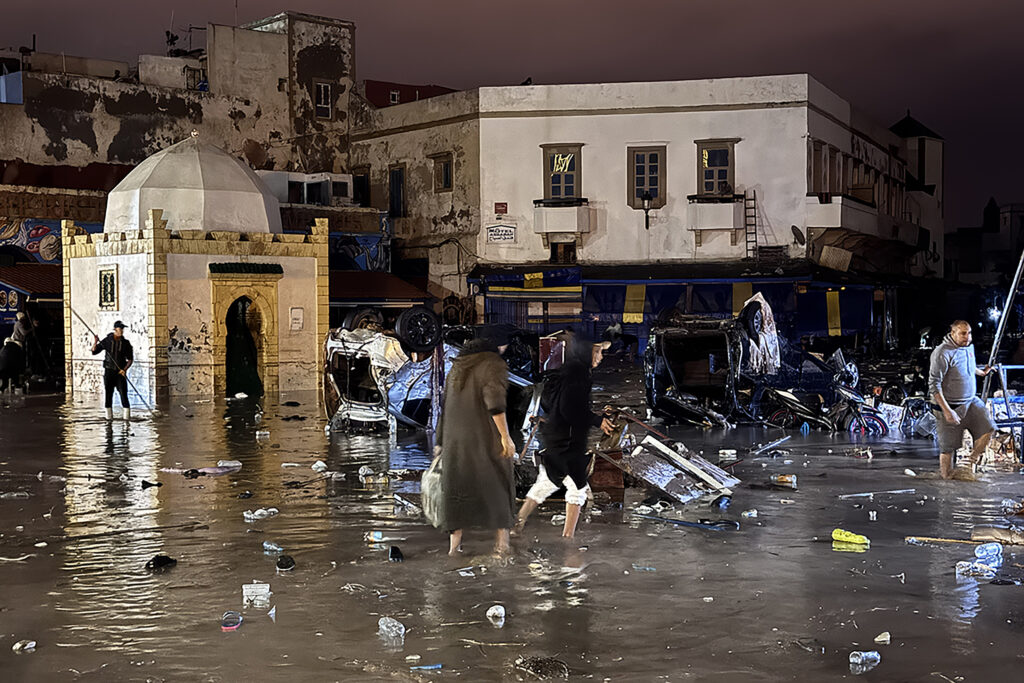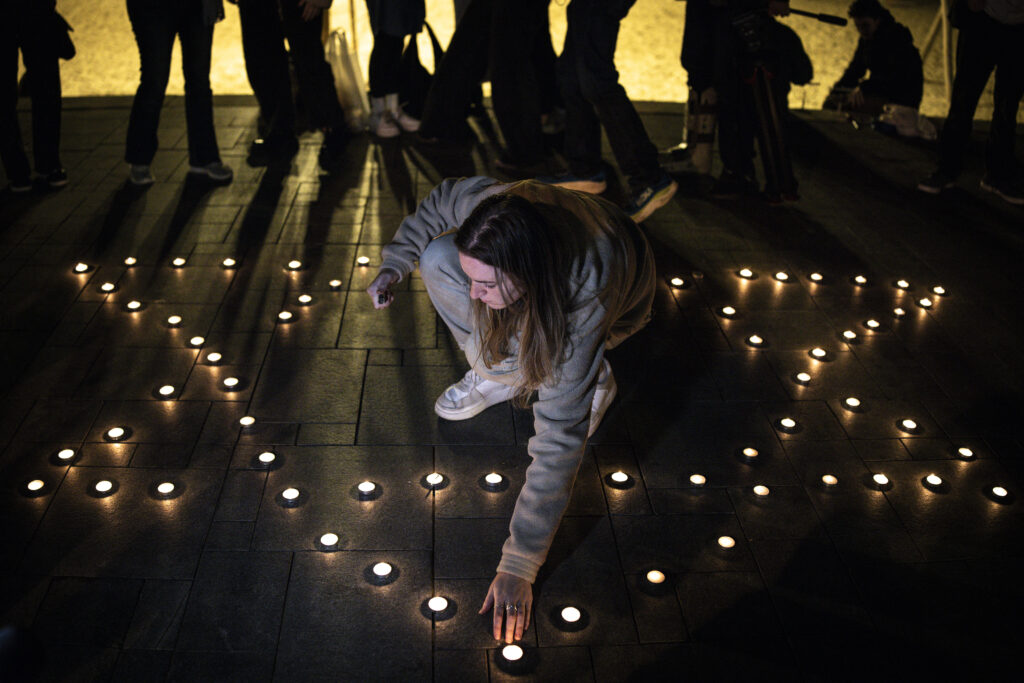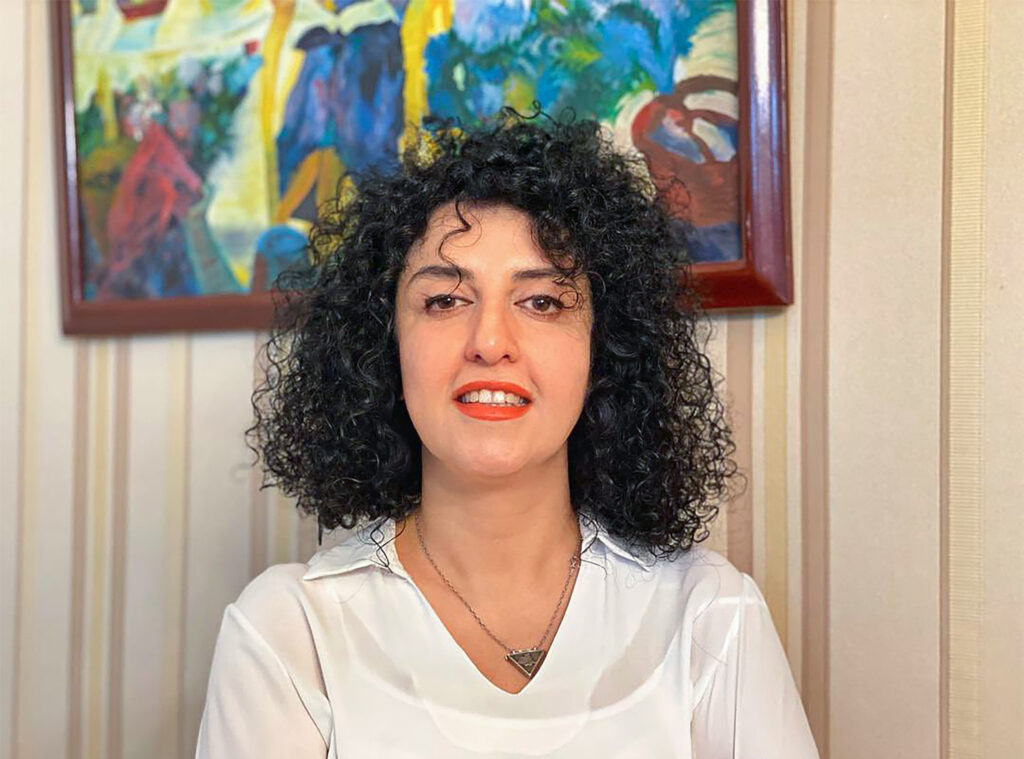AFP Asia Business
Flash flood kills dozens in Morocco town
A flash flood in a Moroccan coastal town has killed at least 37 people, local officials said on Monday, as search and rescue operations continued.Drought-hit Morocco often faces severe weather, but Sunday’s flooding in Safi is already the deadliest such disaster in at least a decade.A muddy torrent swept cars and bins from the streets of the town, which is around 300 kilometres (186 miles) south of the capital Rabat.National weather forecaster the General Directorate of Meteorology (DGM) warned that more thunderstorms were likely over the next three days in several areas, including Safi. Seven survivors were still being treated at the town’s Mohammed V hospital, with two of them in intensive care, according to updated figures from local officials. Schools have been closed for at least three days, as mud and debris clog the streets.”The water overwhelmed us. We couldn’t sleep all night. We lost everything, even my children’s textbooks,” mother of six Hanane Nasreddine told AFP, her voice trembling. Nezha El Meghouari said she had had only moments to escape her home.”I’ve lost all my clothes. Only my neighbour gave me some to cover myself. I have nothing left. I’ve lost everything,” she said.At least 70 homes and businesses in the historic town centre were flooded, and 55-year-old shopkeeper Abdelkader Mezraoui said the retail economy had been devastated.”Jewellery store owners have lost all their stock… and the same goes for clothing store owners,” he said, calling for official compensation to save businesses.Safi is known as a centre for arts and crafts, particularly terracotta pottery, and its streets were left littered with smashed bowls and tajines.The Moroccan prosecutor’s office announced the opening of an investigation to determine if anyone bore responsibility for the extent of the damage, according to official news agency MAP.- Intense storms -Speaking to parliament, Prime Minister Aziz Akhannouch said “37 millimetres (1.5 inches) of rain fell in a short period of time and hit the historic Bab Chabaa district (in Safi), which is crossed by a river, causing the deaths of numerous merchants and workers”. Late on Sunday, rescuer Azzedine Kattane told AFP about the strong “psychological impact of the tragedy” in light of the large number of victims.As the waters receded, they left behind a landscape of mud and overturned cars. Onlookers watched Civil Protection units and local residents working to clear debris.Morocco is struggling with a severe drought for the seventh consecutive year, while last year was the North African kingdom’s hottest on record.Climate change has made storms more intense, because a warmer atmosphere holds more moisture and warmer seas can turbocharge weather systems.Flash floods killed hundreds in Morocco in 1995 and scores in 2002.
In Israel, Sydney attack casts shadow over Hanukkah
With heavy hearts, Jews in Israel lit the year’s first Hanukkah candles, mourning after gunmen opened fire on a Jewish gathering in Australia, killing 15 and reviving painful memories of the October 7, 2023 attack.Sunday’s attack in Bondi Beach was Australia’s worst mass shooting in decades, and has been decried as antisemitic “terrorism” by Israeli authorities and many others around the world.”It was awful and so reminiscent of October 7. For many people here, it’s very traumatic,” Bill Fogel, 69, told AFP in Jerusalem, referring to Hamas’s deadly 2023 cross-border attack on southern Israel, which resulted in the deaths of 1,221 on the Israeli side.The Israeli-American said he had lit the first Hanukkah candle on Sunday with friends from Sydney’s Jewish community and followers of a rabbi killed in the shooting.”Being Jewish means constantly being vigilant,” Fogel told AFP at a popular Jerusalem bakery where customers rushed to place orders for Hanukkah.Next to Fogel stood Ayelet, 37, who said “the light of the holiday has been somewhat dimmed”.”Our hearts are with the people of Sydney. But I think that just as we grew stronger from October 7, we will also grow stronger from events like this,” she told AFP. “Most of all, we will continue to celebrate as much as possible.”Hours after the shooting, a candlelight vigil was held on a beach in the city of Tel Aviv where mourners lit candles arranged to look like the Star of David.- ‘Tough time for community’ -In Tel Aviv, the vigil’s attendees carried Israeli and Australian flags.”This is a very tough time for our community. We have lost a rabbi, we have lost friends, we’ve lost children,” Nir Golan, an Australian Jew, told the vigil.”Out of darkness comes light, so let’s all pray for peace and strength and healing for the community in Sydney,” Golan said, overcome with emotion.The Sydney shooting has also sparked strong emotions in the Israeli media.”Hanukkah massacre” wrote one of Israel’s best-selling dailies, Yediot Aharonot, which devoted six pages to covering the attack.”The light of Hanukkah has gone out,” wrote another daily, Israel Hayom.In an editorial for Yediot Aharonot, journalist and commentator Nadav Eyal urged Israel to reach out to the Australian Jewish community.”For two years, they put their lives on hold to help Israelis in need,” Eyal wrote. “Now it’s our turn to ask ourselves: what can we do for them?”- Warning to Israeli travellers -In response to the attack, Israel’s Prime Minister Benjamin Netanyahu’s office announced stricter security measures for Israeli travellers.”It is strongly recommended to avoid attending unsecured mass gatherings, including events at synagogues,” the office said in a statement.But despite the fears of rising antisemitism, many in Israel remained defiant.In west Jerusalem’s Zion Square where street singers charmed passers-by and young people handed out doughnuts, 29-year-old Elinor Chaim refused “to be sucked into sadness”.”We must not let darkness prevail over light. That’s the meaning of Hanukkah,” she said.
Iran Nobel winner unwell after ‘violent’ arrest: supporters
Iranian Nobel Peace Prize winner Narges Mohammadi was taken to hospital twice after being violently arrested last week, her supporters said Monday, following a telephone call with the campaigner that raised concerns about her physical condition.Mohammadi, who won the 2023 Nobel prize, was detained Friday after addressing a memorial ceremony in the eastern city of Mashhad for lawyer Khosrow Alikordi, who was found dead earlier this month.Iranian civil society activists including prize-winning filmmaker Jafar Panahi meanwhile called for the “immediate and unconditional release” of Mohammadi and other campaigners arrested at the ceremony.There had been no information about her whereabouts or communication with her until late Sunday when she made a “short and compressed” telephone call to her family, her foundation said in a statement.In the call, Mohammadi related how at the ceremony she “was attacked by plain clothed agents with severe and repeated baton blows to the head and neck and was then violently arrested”.”Narges Mohammadi said in the call that the intensity of the blows was so heavy, forceful, and repeated that she was taken to the hospital emergency room twice,” said the foundation, adding that in the call “her physical condition was not good, and she appeared unwell”.One of her brothers Hamid Mohammadi, who lives in Norway, told AFP in Oslo that Narges Mohammadi had called another brother inside Iran, telling him she was hit “brutally” on the head and her face and “as a result had been taken to be checked by a physician”.”She’s not hospitalised and is still in detention,” he said.- ‘Violent manner of arrest’ -According to Mashhad prosecutor Hassan Hemmatifar, 38 people were arrested at the ceremony including Mohammadi and fellow prominent activist Sepideh Gholian for inciting people to chant slogans that “violated the norms”. Alikordi’s brother Javad was arrested later the same day.Rights groups, including Mohammadi’s foundation, have described Alikordi’s death as “suspicious”, calling for an investigation. Iranian officials have said the lawyer, 45, died of a heart attack.The Nobel peace committee has described her arrest as “brutal” with chair Jorgen Watne Frydnes telling AFP on Saturday it “called on the Iranian authorities both to clarify where she is, how she is, but first and foremost, actually release her from prison”.Mohammadi, who has spent much of the last decade in and out of jail, had been allowed out of prison in December 2024 on medical leave. Over the last year, she has continued campaigning.Images of the ceremony showed Mohammadi — not wearing the headscarf that is obligatory for women in public in the Islamic republic — climbing atop a car to address crowds who chanted slogans against the authorities.- ‘Worrying state of freedom’ -During the call, Mohammadi asked her family to “immediately and without delay file a formal complaint against the detaining security body and the violent manner of her arrest”.It is unclear what she and the other activists detained are accused of, and the statement also said Mohammadi was unaware “which security authority is currently detaining her”.The foundation said that, according to Mohammadi, “during and after her arrest she was accused of ‘cooperating with the Israeli government'”. Iranian authorities are yet to confirm any charges.Activists say Iran remains in the throes of a deep crackdown more than five months after the end of the 12-day war against Israel, with over 1,400 people executed so far this year.Panahi, fellow director Mohammad Rasoulof and over a dozen other activists said what happened at Alikordi’s memorial ceremony “was a stark reflection of the worrying state of freedom and security, and, consequently, the inefficiency and lack of accountability of the authorities in today’s Iran”.”The deep political and social deadlock in the country can only be resolved through the restoration of sovereignty to the people,” the statement signatories said.Pahani, whose last film “It Was Just an Accident” won top prize at the Cannes Film Festival this year and has been nominated for an Oscar, has been sentenced to one year in prison over “propaganda activities” against the Islamic republic.Currently touring to promote the film, he has said he nonetheless plans to return to Iran.
Iran Nobel winner Narges Mohammadi ‘unwell’ after violent arrest: supporters
Iranian Nobel winner Narges Mohammadi was taken to hospital twice after being violently arrested last week and appeared unwell in her first telephone contact since being detained, her supporters said Monday.Mohammadi suffered “severe and repeated baton blows to the head and neck” during her arrest and in the call “her physical condition was not good, and she appeared unwell”, her foundation said in a statement.Iranian civil society activists, including prize-winning filmmaker Jafar Panahi, called for the “immediate and unconditional release” of Mohammadi and other campaigners arrested on Friday.Mohammadi, who won the 2023 Nobel prize, was detained after addressing a memorial ceremony in the eastern city of Mashhad for lawyer Khosrow Alikordi, who was found dead earlier this month.The foundation said Mohammadi was “taken to the hospital emergency room twice” following her arrestHamid Mohammadi, one of her brothers who lives in Norway, told AFP in Oslo that Narges Mohammadi had called another brother inside Iran, telling him she was hit “brutally” on the head and her face and “as a result had been taken to be checked by a physician”.”She’s not hospitalised and is still in detention,” he said.Panahi, fellow director Mohammad Rasoulof and over a dozen other activists said what happened at Alikordi’s memorial ceremony “was a stark reflection of the worrying state of freedom and security, and, consequently, the inefficiency and lack of accountability of the authorities in today’s Iran.””The deep political and social deadlock in the country can only be resolved through the restoration of sovereignty to the people,” the signatories to the statement said.Pahani, whose last film “It Was Just an Accident” won top prize at the Cannes Film Festival this year and has been nominated for an Oscar, has been sentenced to one year in prison over “propaganda activities” against the Islamic republic.Currently touring to promote the film, he has said he nonetheless plans to return to Iran.
Trapped, starving and afraid in besieged Sudan city
In Kadugli, a besieged city in Sudan’s Kordofan region, escalating violence and worsening famine have left civilians trapped in a state of constant fear, according to testimonies gathered by AFP.Two and a half years of war between the army and the paramilitary Rapid Support Forces have ravaged the South Kordofan state capital, with strikes intensifying in recent weeks.The latest, a drone strike on a United Nations peacekeeping base on Saturday, killed six Bangladeshi troops.AFP has obtained two rare accounts of daily life in the embattled city, anonymised for safety reasons.Under a communications blackout, internet use is limited, expensive and monitored by the army authorities that control the city.Here are the accounts of life today in Kadugli, where the UN has declared famine and repeatedly warned of “brutal escalation”.- ‘Surrounded on all sides’ -Both residents spoke of rapidly escalating violence. “We’ve had a lot of shelling and drone attacks lately,” one said, describing life “in fear that random shelling can happen at any time.”It has forced “everyone to confine themselves into their homes”.The city, hemmed in by the Nuba Mountains, is controlled by the army but “surrounded on all sides” by paramilitary forces.One road leads out of the city in both directions: south to the South Sudan border, or north, to the similarly besieged and starved city of Dilling.But a year and a half ago, this road “was cut off” by the Sudan People’s Liberation Movement-North (SPLM-N) faction led by Abdelaziz al-Hilu, allies of the RSF.”With this road closed, the city of Kadugli became completely isolated from the rest of Sudan,” the source said.These fighters are now positioned on the eastern highlands overlooking the city.”You can see them clearly with your bare eye at the top of the mountain, with their heavy artillery,” they added.- Caught in the crossfire -On the other side is the RSF, and both the paramilitary and the army “send heavy shells randomly into the city from time to time”.”Civilians are facing a tragic situation, we are at risk of being injured by heavy artillery, bullets that fall on our heads randomly, attacks that… clearly target everything in the city, not only military targets, but also places where internally displaced people live,” said the resident.Besides the fire overhead, people also live in fear of accusations of espionage that get people “thrown into prison” and “executed in cold blood”, another person said.”It is not only the drone strikes that we fear, but we also feel equally endangered by the government and the (army), as we are often accused of spying” for the paramilitary.”This contributes to our increased anxiety, we are at risk all the time.”- Poison fruit -Under siege, what little supplies do get through are “smuggled in at very high prices, which most families cannot afford,” the first source told AFP.Everything is in short supply, the other said, especially “food… and medicine”, they added.Most families “depend on only one local item: sorghum”, a staple cereal also in short supply.While some “produce some vegetables from their home gardens”, many have been forced to “eat what they find in the forest just to ensure they survive. And then of course, a lot of families depend on begging.”The hunger has driven some to horrific deaths.”I would like to share the story of four siblings, aged four to 12. They died after eating fruit from a poison tree, after having nothing else to eat…”They were laid to rest in the cemetery here, it’s a memory that will remain etched in my mind.”




